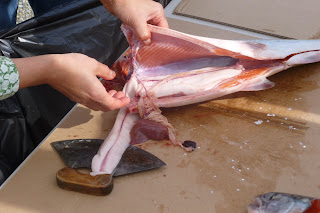Now when I say observe I put extra emphasis on that word, because literally it's all I can do. Seal hunting is only permitted when the hunter is a subsistence hunter. The subsistence hunter does so for survival. There is no waste. The entire animal serves a purpose. Hunting is not a game here, it's a means of living. I, myself, am only allowed to watch. It's illegal for me to steer the boat or even touch the motor from what I've been told.
When I asked Mark after school about tagging along he simply said, "4:15. The river near the school." Mark is a man of few words, but he is a man of many jobs. He handles "maintenance" at the school, which means he is responsible for all kinds of odd jobs around the school from electronics to plumbing. He is also an excellent fisher and hunter when he's not fixing something at school. I told him I'd be there, but did not really know what to expect.
I met up with Mark down by the river. He picked me up on his boat with his 8-year-old son. I wore shin length rubber boots, waterproof pants, a NorthFace raincoat, and a winter stocking hat. I was still cold. Mark was wearing a bubble jacket and a tan fedora. I noticed a rifle and a harpoon lying on the boat with several empty cans of Diet Dr. Pepper. He flipped me a life-jacket and we were off. We traveled south down the Kuskowim river for about an hour. There was no sign of any seals. I imagined the place we were going to be some frosty coastline abundant with seals lying out waiting to be picked off. On the way Mark mentioned that there was only a 10% probability that we would see a seal. Hunting takes more patience than I thought.
After fruitlessly scoping out all the seal hotspots, Mark turned my attention to some enormous round tracks in the mud. "Moose tracks," he said slowing the boat down and leaning over to examine the large prints. "Fresh moose tracks," he repeated confidently. All of a sudden we were on a different chase when we saw several more sets of tracks along the water, evidence of a thirsty moose. Mark tapped me on the shoulder when he saw kept seeing more tracks. "We will probably see a moose," he remarked. With his attention turned to moose, Mark gave the steering wheel of the boat to his son who maneuvered through the extremely narrow twists and turns of a tributary nearby. While I was watching in astonishment at the precision of an 8-year-old driving a boat, Mark was busy surveying the surrounding land with his binoculars. I turned my attention to Mark, whose sharp eyes were deliberately scanning the area. If there was a moose to be found, I knew he would find it.
After searching for a while, Mark grabbed my shoulder, and simply said, "Look!" I turned to see a moose on the edge of the water staring at us. We couldn't shoot it because it's not moose season yet, (it starts in September) but Mark wanted to see where the moose would be so he can come back to this spot later. It was my first time seeing a moose in person, and it's just a bizarre animal to me. It's like a cow on stilts that effortlessly steps through the brush with powerful strides. I was able to snap a few pictures before the moose decided to turn back into the seclusion of trees behind it.








































